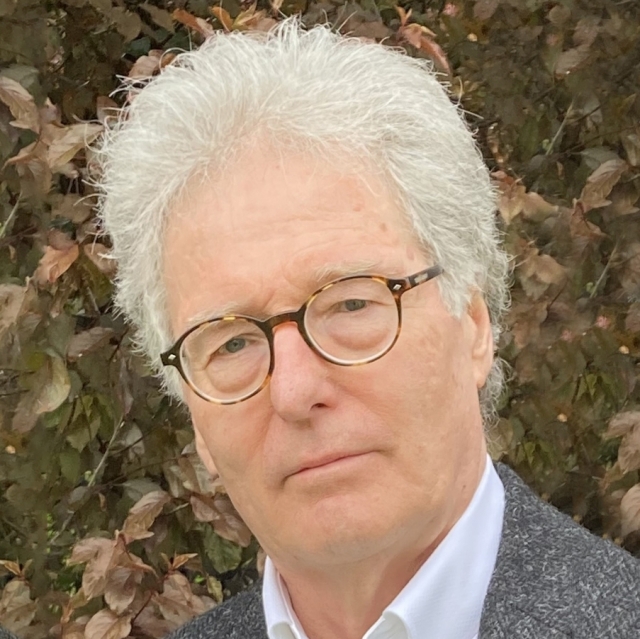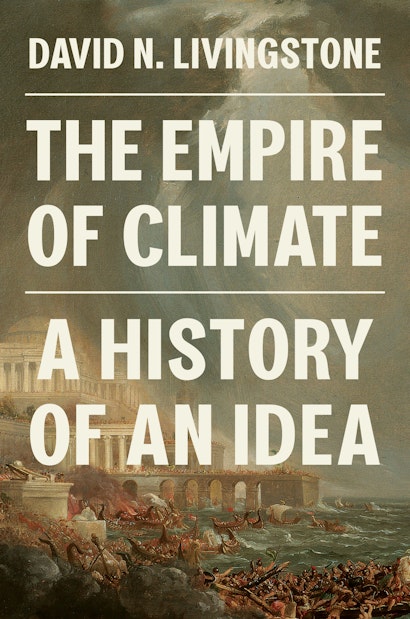Scientists, journalists, and politicians increasingly tell us that human impacts on climate constitute the single greatest threat facing our planet and may even bring about the extinction of our species. Yet behind these anxieties lies an older, much deeper fear about the power that climate exerts over us. The Empire of Climate traces the history of this idea and its pervasive influence over how we interpret world events and make sense of the human condition, from the rise and fall of ancient civilizations to the afflictions of the modern psyche.
Your book is entitled The Empire of Climate. Why did you choose that title and what is the book about?
DNL: I confess I shamelessly culled my title from a remark by the eighteenth century philosophe Montesquieu, who observed in his famous Spirit of the Laws in 1748 that the “empire of the climate is the first, the most powerful of all empires.” What he had in mind was the influence that various climates had on local cultures and legislative arrangements. To him, the climate shaped human society in manifold ways. He was convinced that religious belief systems, for instance, could not be satisfactorily transferred from one climatic regime to another. It’s the history of this idea – broadly construed – that I have tried to plot in the book. So it’s a story of the ways in which climate has been mobilized as a determining – often the determining force – in human history across the globe.
Throughout the book you refer to the concept of ‘climatic determinism’ and sometimes to ‘climate reductionism’. What do you mean by these terms?
DNL: Yes indeed, these terms do feature pretty frequently in my account. Climate determinism is simply the view that various aspects of human society, perhaps even global history tout court, can be directly explained by the agency of climate. As such it’s a version of what’s often called environmental determinism. Climate reductionism is a related term introduced, I think, by the geographer and climate scientist Mike Hulme. For him it’s the thought that all sorts of explanations are frequently ‘reduced’ to climatic causes. In other words, it’s the methodological inclination to extract climate change from its wider social, political, cultural and environmental contexts and present it as the explanation par excellence of some state of affairs. In that vein, it’s a sub-species of a more general scientific reductionism. Critiquing these, I should add, is not to diminish the tremendous challenge that climate change is posing to our own society. It is rather to elucidate how climate’s effects are filtered through cultural particularities and take their place alongside a myriad other formative forces.
You focus on the history of ideas about how climate is supposed to have determined matters of human health, mental life, global wealth and warfare. Why did you choose to write about these particular subjects?
DNL: I guess you could say that I have been unconscionably presentist in making these choices. I followed these four trails simply because they are prominent fixtures on our own horizon in the early twenty-first century. Routinely – maybe even daily – we find op-eds, newspaper headlines, science magazines, online blogposts, and many more, telling us that climate change is bringing – and will continue to bring – unprecedented challenges to our medical systems, and that it will lead to a deterioration in our mental wellbeing and acuity; we hear that climate change will bring poverty to vast stretches of the earth and that civilization as we know it will collapse; we are told that climate-induced resource scarcity will result in a vast increase in both civil wars and international conflicts. What I’ve tried to do is to plot a kind of genealogy of these ideas by showing that in fact they have a long history, and to caution against some of the more sinister directions in which similar narratives have moved.
Throughout the book you work between past, present and future in the narratives you construct. Can you explain that for readers?
DNL: What pushed me in this direction was the realisation that the authors of numerous works of historical research on past climate and society feel the need to extract warnings about the dangers of climate change for the present day, and from time to time to project their findings into the future. At the same time, many of those – call them futurists – who are deeply concerned about future life on the planet in the Anthropocene era resort to historical episodes to inform their predictions. So we have what we might call ‘the history of the future’ and ‘the future of history’ closely intertwined. In one sense there is nothing wrong about this. We live in the present and whatever we might say about putting ourselves into the minds of past actors and the like, we can’t escape the conditions of our own time. Yet there are problems too if we too readily read our own anxieties and challenges into previous generations. Anyhow, that’s why I frequently move between the present, the past, and the future in how I try to take the measure of ‘the empire of climate’.
A good deal of your story dwells on dark episodes in the cultural history of climate. Could you elaborate on just a couple of these?
DNL: Perhaps three of the most troubling moments in the narrative I present come from the nineteenth and early twentieth centuries. First: I try to sketch in the role that climatic determinism played in the colonial ambitions of western nations, and its use in rationalising a range of imperial strategies to rule what were often considered to be ‘inferior peoples’ living in noxious climates. Second: I have quite a bit to say about the use of climate explanations to justify slavery. I take the slavocracy of the Old South as a case in point. Here I try to show the crucial role that climatic thinking had in justifying the slave system as an inevitability arising from the different agricultural systems north and south of the Mason-Dixon line. Third, and perhaps more surprisingly, the connections between climatic thinking and eugenics in the early decades of the twentieth century make for sobering reading. While eugenics is usually thought of as more akin to genetics, ideas about climatic influence were frequently mobilised in arguments about immigration restriction, birth rate, and other pet peeves among eugenicists.
Are there any brighter moments from which we might take inspiration?
DNL: I have to admit that a good deal of The Empire of Climate is painted in sombre tones. But there are indeed some brighter moments. Some of those interested in climate-society interactions have helpfully illustrated the ways in which climate’s influence is mediated through social, political and cultural conditions. Rather than issuing blanket declarations about its influence on whole societies, or nations, or races, these writers seek to disaggregate the ways in which climate’s influence is channelled through patterns of wealth and poverty, governance structures, historical trajectories, and so on. In so doing they resist the thought that human society lies helpless in the face of environmental challenges and provide hope that human agency may mitigate the worst consequences of runaway climate change.
We are living in perilous times so far as climate change in concerned. Why should we be bother at all with the history of ideas about climate in the distant, or even recent, past?
DNL: In a way, what I am trying to do is write a history of the present. Starting from contemporary woes and warnings, I have sought to trace out the directions in which ideas about climate’s determining influence have spiralled, in part to provide a cautionary tale for our own time. The ease with which some publicists catastrophise our futures – sometimes with good reason – can rather too easily fail to discern the toxic ways in which climate determinism has often been used. I’ve mentioned just a few dark episodes a moment ago. A greater awareness of these might – just might – help in disciplining our rhetoric and motivating people to work responsibly towards curbing humanity’s reckless treatment of our own environment.
David N. Livingstone is professor emeritus of geography and intellectual history at Queen’s University Belfast. He is a fellow of the British Academy and a member of the Royal Irish Academy. His many books include Putting Science in Its Place: Geographies of Scientific Knowledge; Dealing with Darwin: Place, Politics, and Rhetoric in Religious Engagements with Evolution; and Adam’s Ancestors: Race, Religion, and the Politics of Human Origins.

